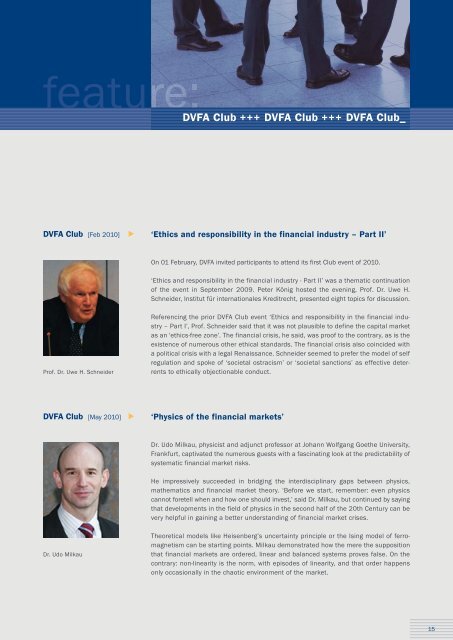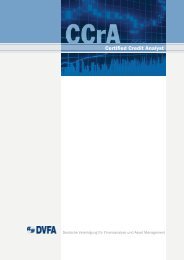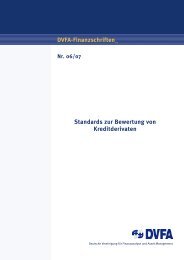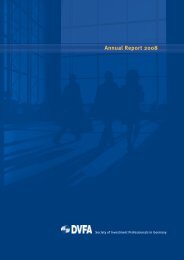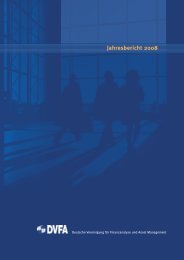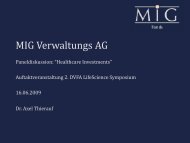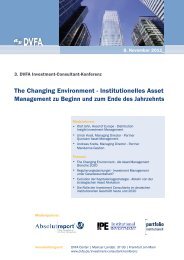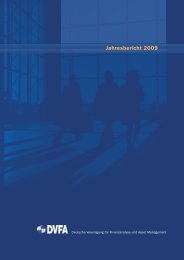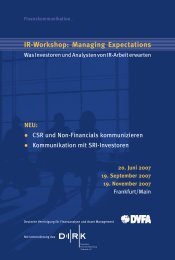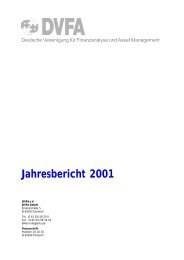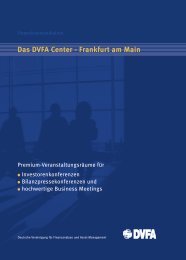Equities - DVFA
Equities - DVFA
Equities - DVFA
Create successful ePaper yourself
Turn your PDF publications into a flip-book with our unique Google optimized e-Paper software.
featu <strong>DVFA</strong> Club +++ <strong>DVFA</strong> Club +++ <strong>DVFA</strong> <strong>Equities</strong>_ Club_<br />
<strong>DVFA</strong> Club [Feb 2010] u<br />
Prof. Dr. Uwe H. Schneider<br />
<strong>DVFA</strong> Club [May 2010] u<br />
Dr. Udo Milkau<br />
‘Ethics and responsibility in the financial industry – Part II’<br />
On 01 February, <strong>DVFA</strong> invited participants to attend its first Club event of 2010.<br />
‘Ethics and responsibility in the financial industry - Part II’ was a thematic continuation<br />
of the event in September 2009. Peter König hosted the evening, Prof. Dr. Uwe H.<br />
Schneider, Institut für internationales Kreditrecht, presented eight topics for discussion.<br />
Referencing the prior <strong>DVFA</strong> Club event ‘Ethics and responsibility in the financial industry<br />
– Part I’, Prof. Schneider said that it was not plausible to define the capital market<br />
as an 'ethics-free zone’. The financial crisis, he said, was proof to the contrary, as is the<br />
existence of numerous other ethical standards. The financial crisis also coincided with<br />
a political crisis with a legal Renaissance. Schneider seemed to prefer the model of self<br />
regulation and spoke of ‘societal ostracism’ or ‘societal sanctions’ as effective deterrents<br />
to ethically objectionable conduct.<br />
‘Physics of the financial markets’<br />
Dr. Udo Milkau, physicist and adjunct professor at Johann Wolfgang Goethe University,<br />
Frankfurt, captivated the numerous guests with a fascinating look at the predictability of<br />
systematic financial market risks.<br />
He impressively succeeded in bridging the interdisciplinary gaps between physics,<br />
mathematics and financial market theory. ‘Before we start, remember: even physics<br />
cannot foretell when and how one should invest,’ said Dr. Milkau, but continued by saying<br />
that developments in the field of physics in the second half of the 20th Century can be<br />
very helpful in gaining a better understanding of financial market crises.<br />
Theoretical models like Heisenberg’s uncertainty principle or the Ising model of ferromagnetism<br />
can be starting points. Milkau demonstrated how the mere the supposition<br />
that financial markets are ordered, linear and balanced systems proves false. On the<br />
contrary: non-linearity is the norm, with episodes of linearity, and that order happens<br />
only occasionally in the chaotic environment of the market.<br />
15


